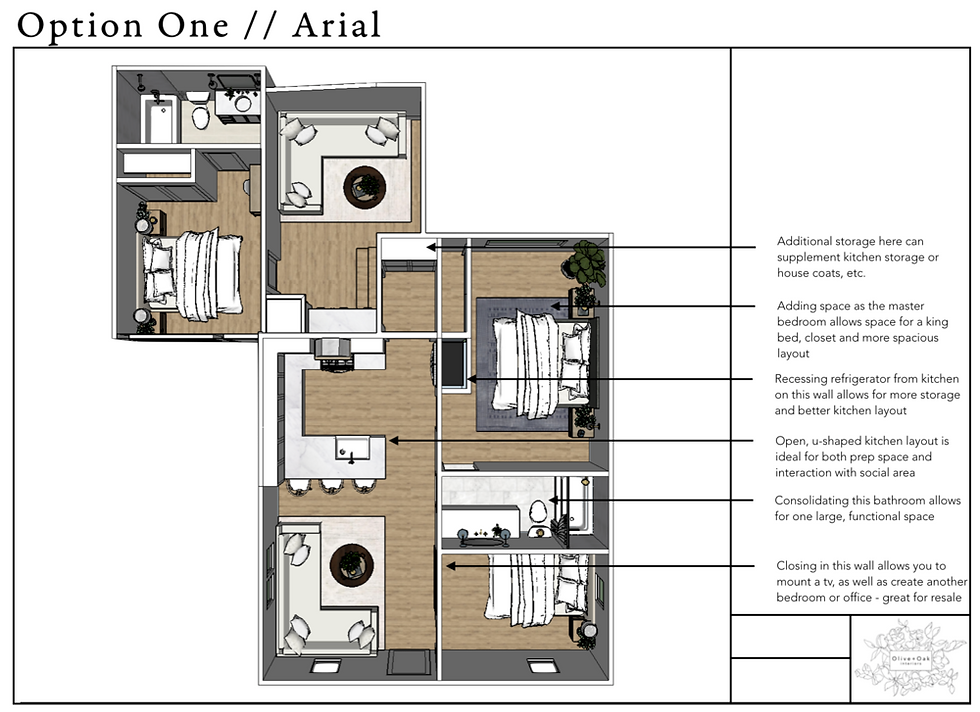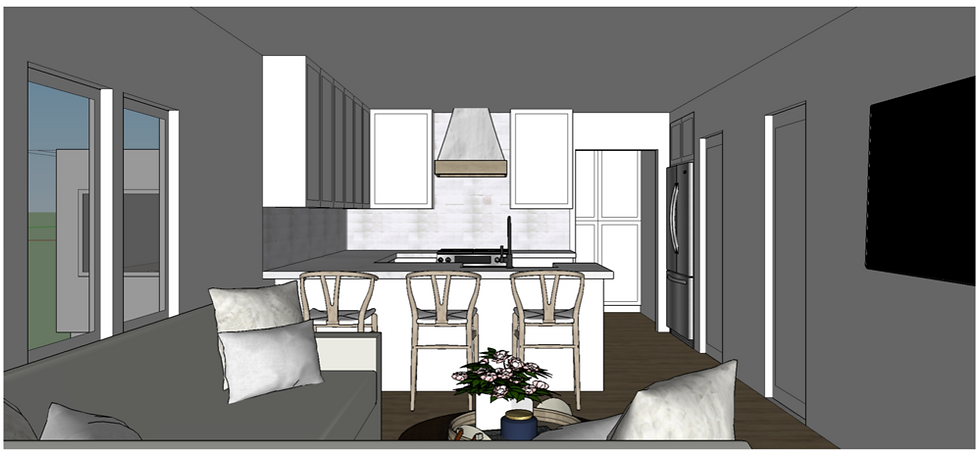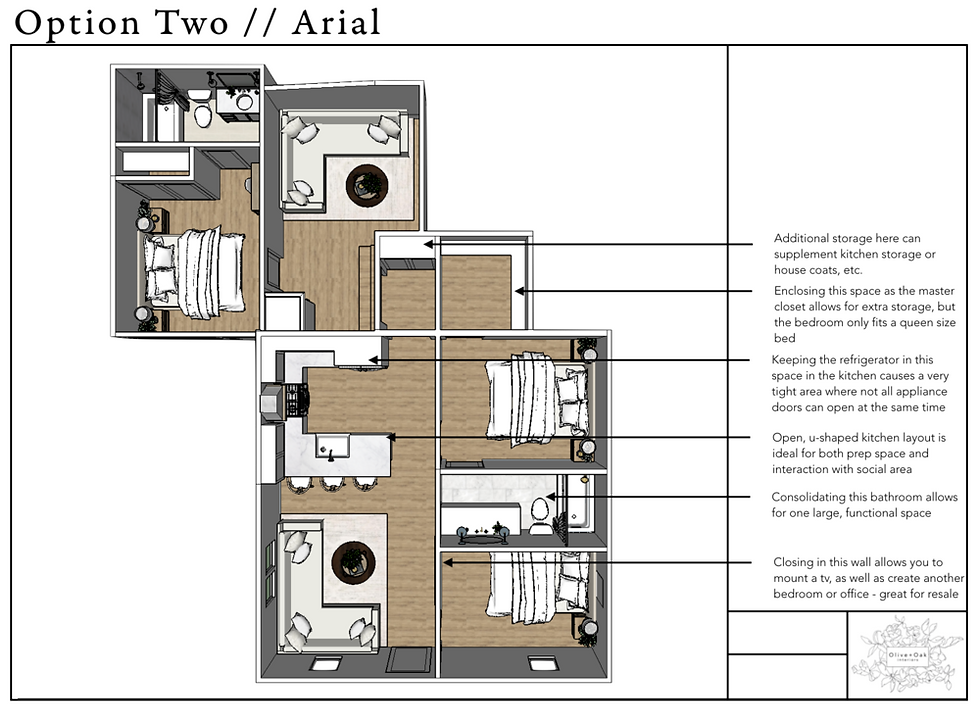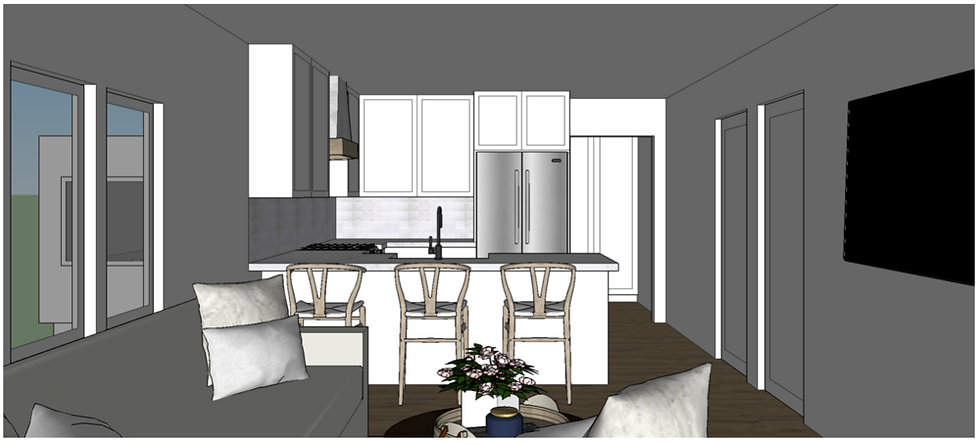Tips for Hiring a Contractor
- oliveandoakinterio
- Mar 31, 2019
- 7 min read
Updated: Mar 22, 2022
We’ve all heard them - the nightmare renovation stories. We’ve heard about the projects that went on forever, went way over budget, where huge mistakes were made, and even the ones where the contractor disappears with egregious sums of cash, fleeing the country and leaving unsuspecting homeowners without drywall or their life’s savings.
These horror stories hit so close to home because the perpetual frustration and / or fear that made up the experiences were, in fact, in someones home. There’s nothing more personal than what happens day-to-day in your house, and even the thought of inviting a band of strangers in to dismantle it can feel slightly unnerving to say the least.
To further that uncertainty, for most people the nuts and bolts of the renovation process are typically so far out of our wheelhouse of knowledge, we don’t feel we could even accurately keep our contractor in check once the process begins. If you’re anything like most of my clients, you only have a mild understanding of what a rough-in valve might do, much less how to install one properly.
Given that a renovation does mean getting up close and personal with a contractor and you don’t know what you don’t know, here are some things you can ask to make sure you feel confident about the contractor you’re hiring and avoid learning the hard way:
1. Do they have happy clients?
Whether they have five stars on Yelp or a long list of past client’s contacts they can give you as a reference, happy clients are a great sign. Don’t be afraid to actually call past references.
2. Are they “by the books”?
Are they licensed and insured? A contractor should be willing and able to supply their license number (it’s often on their business cards), and on a larger renovation it’s good to ask what insurance or bond they have so you know if and for how much they would be covered if something were to go seriously wrong. “By the books” also means the contractor plans on getting permits and inspections in addition to complying with local codes, so make sure to inquire about those points as well.
3. Do they have a written contract?
We all hope a renovation would never lead to litigation, but God forbid it does, it behooves you to have a contract in place. In addition to protecting you, a written contract further indicates professional character in your contractor. A contract does not mean the bid that they make up for you outlining your costs, but is a full document outlining specifics around warranties, mistake policies, and other important procedural items.
4. Do they use a project management software?
A good contractor might use a project management software to plan out workflow as well as what tradesmen will be on the job site when. This is a great feature because not only will you have clear expectations about who will be in your home, but also a clear sense of when to expect completion. Project management software also helps you know when any items that are ‘Client Provided’ are needed so you can be sure to have them ready in time and avoid holding up the project.
If your contractor doesn’t use a management software, get them to write out when you’ll need to provide all ‘Client Provided’ items in order to avoid delays. The last thing you want is the job to take longer because you were told the day before plumbing is needed and your fixture has an eight-week lead time.
5. How accurate are their estimates?
Two critical things to ask before you start working with a contractor are, of course, the estimated cost (which they should provide you with in an itemized proposal) and estimated time frame for completion. Once you’ve received both of these answers, I recommend following up by asking the following questions:
“What percentage of the jobs that you do are finished on time and on budget (given the client doesn’t add to scope)?”
“What (outside of adding to the scope) would cause this project to cost more or take longer than you’ve projected?”
“What is the absolute longest you would anticipate this project taking? What are the fiscal ramifications on your part should the project extend beyond that timeframe?”
A great contractor will confidently know how to answer these questions without excessive uncertainty or hesitation.
If they aren’t a ‘numbers person’ or don’t have a business coach looking at their performance, they may not be as quick to answer the first question, but it’s a great sign if they can.
A good contractor should be able to tell you what obstacles may slow the project down, if anything. For example, if your potential contractor is concerned that a wall may be structural but isn’t certain, I would highly advise you or they hire a specialist to verify important elements like those prior to moving forward because of the potential cost and time variation associated with that unknown.
The last question is intended to help make sure you’re a priority for the contractor. If your contractor needs to make ends meet they may start a new job to stimulate cash flow, putting yours on hold. This can extend project times and cause frustration on your part, so being clear you’re unwilling to be put on the back burner up front is a good way to insure you are made a priority.
6. Who are their tradesmen?
Whether it’s the carpenter, dry-waller, plumber, electrician, painter, tile installer, counter fabricator, etc. there are a number of specialized trades required to complete a renovation. It’s good to ask your contractor if both how many jobs they work on at one time and if they use the same trades people on every job, or how they select who will work on your job. If they limit the number of jobs they take on to make sure their core team is the only one who they work with, that means the dynamic that created their positive reviews or references will likely be the same as what you will experience. Having a team that often works with one another often allows for smoother work flow and less mistakes.
Another detail to ask is if the contractor uses a ‘Jack of all trades’ to do many of the specialties listed above. If the person doing your drywall is also laying tile and doing your electrical, chances are that they aren’t specialized in any one of those categories. Though it is absolutely possible to be highly trained in more than one area, there is a reason the slogan goes, “jack of all trades, and master of none”. Use caution and ask your contractor this up front to insure the quality of work will be what you’re looking for.
7. When will I be making payments?
Make sure that you’re comfortable with the payment schedule. It’s good not to pre-pay past what you’re comfortable with to avoid feeling over exposed financially. Ask any questions beforehand to insure you’re comfortable and prepared.
8. What is your policy should I want to change / add to the scope?
It’s quite common to want to add to a project once you get the ball rolling. Working with an interior designer can help you to avoid this, but knowing if there are any penalties or fees associated with this going in will help you make sure to avoid unwanted surprises down the road.
9. Do you work with allowances? What materials are you assuming I’ve selected / finishes are you assuming I’ve chosen with your bid?
Unless you want the most basic finishes on every selection, be sure to ask what’s included in the bid you’re given. In order to get the job, contractors may include things like very textured dry wall and satin-nickel finishes throughout to come in as low as possible. This can result in additional charges during construction, which makes it very hard to estimate total cost. As such it’s best to work through as many selections before getting your bids as possible (perhaps with an interior designer) so you not only know all of your bids are apples to apples, but that you have a knowledgeable advocate on your side throughout the construction process.
10. Job site rules and hours?
Workmen cussing, smoking, playing loud music, starting before you’re ready or staying into late hours can all make a job unbearable. Make sure you’re on the same page with your contractor going in so you won’t have any unpleasant surprises.
11. What is the best method of communicating with you?
Again, being on the same page about communication policies and response times will make sure your expectations are aligned before diving in.
12. What happens if you make a mistake or misunderstand something?
There are so many details that make up a renovation, ‘winging it’ often leads to undesirable mistakes. The best way to avoid these mistakes is by making sure your intent is clear to everyone involved through the use of design documents. Design documents are created by an interior designer, and clearly outline the specifics of your intent to protect your investment by insuring all of the details are called out. Design documents prevent detail oversight, clarify costs and materials and squarely place the liability back on your tradesmen for any errors or misassumptions.

If this all feels overwhelming, don’t worry - we’d be happy to be on your team throughout this process. Starting with an interior designer means you can get a solid plan in place before diving into the construction phase. We’re here to help you decide the best plan for your space based on your desired budget and intent for the home. We walk you through the potential costs associated with each option we’re proposing and can illustrate your options in 3D so you can make an informed decision. Working with us before hiring a contractor allows you to stretch your dollar further, insures you’re investing in the right finishes, accelerates the construction timeline, adds a professional advocate to your team, and prevents headaches and mistakes during construction saving you time, money and stress.




Regardless of whether you’ve worked with a designer, we recommend interviewing until you have at least two contractors you feel comfortable with on both reviews and rapport before getting concrete bids and comparing price. Once you get bids back from these contractors, there are lots of proposal-specific questions we advise our clients ask before moving forward, but the questions above should get you started on the right track for starting a renovation with a contractor. To make the process easier, we’ve created this downloadable questionnaire for you - just sign up at this below.
Email Me The Printable Questionnaire*
At the end of the day, it’s important to know that working with a contractor on a renovation is a very personal, collaborative process, so it’s imperative you’re comfortable with the person who will be running your job. When in doubt, trust your intuition! If you don’t feel quite right with someone, don’t ignore that feeling. Do your homework, ask the right questions, set yourself up for success with an interior designer, and trust your gut!


Comments